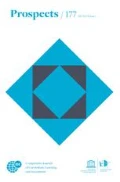References
Arbinger R. (1991) Wissensdiagnostik [Diagnosis of knowledge]. In Ingenkamp K., Jäger R.S. (eds) Tests und Trends, 9. Jahrbuch der pädagogischen Diagnostik. Weinheim, Basel: Beltz, pp. 80–108
Bulach C., Malone B., Castleman C. (1995) An investigation of variables related to student achievement. Mid-Western educational researcher 8(2):23–29
Cohen J., Cohen P. (1983) Applied multiple regression/correlation analysis for the behavioral sciences, 2nd ed. Hillsdale, NJ: Erlbaum
Darling-Hammond, L. 2000. Teacher quality and student achievement: a review of state policy evidence. Education policy analysis archives, vol. 8, no. 1. <olam.ed.asu.edu/epaa/v8n1/>
Estonia. Ministry of Education. 2001. Estonian education strategy “Learning Estonia”. Tallinn: Ministry of Education
Estonia. Ministry of Education; Ministry of Economic Affairs. 2001. Knowledge-based Estonia: Estonian research and development strategy 2002–2006. Tallinn: Ministry of Education
Fowler W.J. Jr., Walberg H.J. (1991) School size, characteristics and outcomes. Educational evaluation and policy analysis 13(2):189–202
Hamilton L., et al. (2003) Studying large-scale reforms of instructional practice: an example from mathematics and science. Educational evaluation and policy analysis 25(1):1–29
Heck R. (2000) Examining the impact of school quality on school outcomes and improvement: a value-added approach. Educational administration quarterly 36(4):513–552
Loucks-Horsley S., et al. (1998) Designing professional development for teachers of science and mathematics. Thousand Oaks, CA: Corwin Press
Ma L. (1999) Knowing and teaching elementary mathematics: teachers’ understanding of fundamental mathematics in China and the United States. Mahwah, NJ: Erlbaum
Martin, M.O.; Mullis, I.V.S.; Chrostowski, S.J., eds. 2004a. TIMSS 2003 technical report. Chestnut Hill, MA: Boston College
Martin M.O., et al. (2004b) TIMSS 2003 International Science Report: findings from IEA’s Trends in International Mathematics and Science Study at the Fourth and Eighth Grades. Chestnut Hill, MA: Boston College
Micklewright J. (1999) Education, inequality and transition. Economics of transition 7(2):343–376
Mullis, I.V.S.; Martin, M.O.; Smith, T.A., eds. 2003. TIMSS assessment frameworks and specifications, 2nd ed. Chestnut Hill, MA: Boston College
Murnane R.J., Phillips B.R. (1981) Learning by doing, vintage, and selection: three pieces of the puzzle relating teaching experience and teaching performance. Economics of education review 1(4):453–465
Organisation for Economic Co-operation and Development. 2001. Reviews of national policies for education. Estonia. Paris: OECD
Raudenbush S.W., Bryk A.S. (2002) Hierarchical linear models, 2nd ed. Newbury Park, CA: Sage
Reiska, P. 1999. Physiklernen und Handeln von Schülerrn in Estland und in Deutschland. Eine empirische Untersuchung zu zwei unterschiedlichen Unterrichtskonzepten im Bereich von Energie und Energieversorgung mit den Methoden Concept Mapping und Computersimulation. Kiel: Universität Kiel. [Dissertation.]
Rivkin, S.G.; Hanushek, E.A.; Kain, J.F. 1998. Teachers, schools and academic achievement. Cambridge, MA: National Bureau of Economic Research. (Working Paper, 6691.)
Tarter C., Bliss F., Hoy W. (1989) School characteristics and faculty trust in secondary schools. Educational administration quarterly l25(3):294–309
Tergan S.O. (1986) Modelle der Wissensrepräsentation als Grundlage qualitativer Wissensdiagnostik. Opladen: Westdeutscher Verlag GmbH
United States Department of Education. 2001. Monitoring school quality: an indicators report. Washington, DC: U.S. Government Printing Office. (Written by Mayer, D.P.; Mullens, J.E.; Moore, M.T.) (NCES 2001–30.)
Von Secker C. (2002) Effects of inquiry-based teacher practices on science excellence and equity. Journal of educational research 95(3):151–160
Von Secker C., Lissitz R. (1999) Estimating the impact of instructional practices on student achievement in science. Journal of research in science teacher 36(10):1110–1126
Weaver G. (1997) Strategies in k-12 science instruction to promote conceptual change. Hoboken, NJ: John Wiley
Willms, J.D.; Smith, T.M. 2005. A manual for conducting analyses with data from TIMSS and PISA. Montreal: UIS. (Report prepared for the UNESCO Institute for Statistics.)
Willms J.D. (2003) Ten hypotheses about socioeconomic gradients and community differences in children’s developmental outcomes. Ottawa: Applied Research Branch of Human Resources Development Canada
Author information
Authors and Affiliations
Corresponding author
Additional information
Original language: English
Kristi Mere (Estonia)
Chief inspector of general education at the Monitoring department of the Estonian Ministry of Education and Research. She has been involved in testing since 1994 when a new centralized school-leaving examinations system was started in Estonia and some people were sent to study testing in Lancaster University, UK. National Project Manager for TIMSS 2003, the first international study that the Estonian students (eighth graders) participated. Her research interest is the quality of teaching and learning. E-mail: Kristi.Mere@hm.ee
Priit Reiska (Estonia)
Senior Researcher and Dean of the Faculty of Educational Sciences, Tallinn University. He has been a member of the Estonian national council of physics education since 2001. His research interests include relevance of science education, interdisciplinary science education, concept mapping and computer simulations in science education. His dissertation (1999, at Kiel University in Germany) was on comparing different teaching methods. In his postdoctoral studies (habilitation) at the Kiel University (2002) he conducted research on the influence of experiments and computer simulations on students’ knowledge. Currently he is the Fulbright Fellow at University of West Florida, USA. E-mail: priit.reiska@tlu.ee
Thomas M. Smith
About this article
Cite this article
Mere, K., Reiska, P. & Smith, T.M. Impact of SES on Estonian Students’ Science Achievement Across Different Cognitive Domains. Prospects 36, 497–516 (2006). https://doi.org/10.1007/s11125-006-9007-5
Published:
Issue Date:
DOI: https://doi.org/10.1007/s11125-006-9007-5

